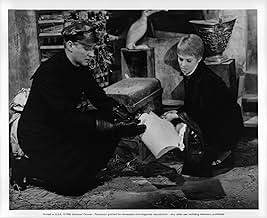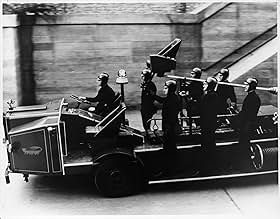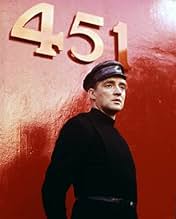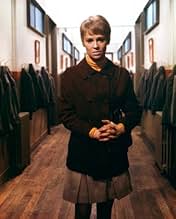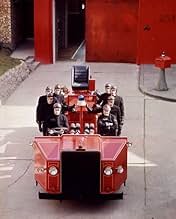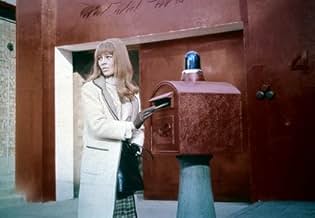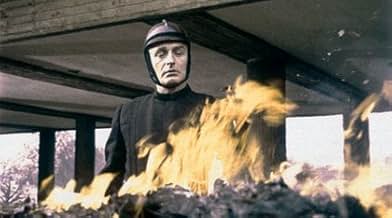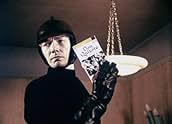AVALIAÇÃO DA IMDb
7,2/10
47 mil
SUA AVALIAÇÃO
Em um futuro opressivo, um bombeiro cujo dever é destruir todos os livros começa a questionar a tarefa que lhe foi confiada.Em um futuro opressivo, um bombeiro cujo dever é destruir todos os livros começa a questionar a tarefa que lhe foi confiada.Em um futuro opressivo, um bombeiro cujo dever é destruir todos os livros começa a questionar a tarefa que lhe foi confiada.
- Direção
- Roteiristas
- Artistas
- Indicado para 1 prêmio BAFTA
- 1 vitória e 4 indicações no total
Gillian Aldam
- Judoka Woman
- (não creditado)
Michael Balfour
- Book Person: Machiavelli's 'The Prince'
- (não creditado)
Alfie Bass
- Book Person: 'The Prince'
- (não creditado)
Yvonne Blake
- Book Person: 'The Jewish Question'
- (não creditado)
Arthur Cox
- Male Nurse
- (não creditado)
Frank Cox
- Book Person: 'Prejudice'
- (não creditado)
Fred Cox
- Book Person: 'Pride'
- (não creditado)
Noel Davis
- Cousin Midge - TV Personality
- (não creditado)
Judith Drinan
- Book Person - Plato's 'Republic'
- (não creditado)
Kevin Eldon
- Robert - First Schoolboy
- (não creditado)
Avaliações em destaque
From Ray Bradbury's novel about totalitarian society that has banned books and printed words in order to eliminate independent thought; Oskar Werner plays professional book-burner who becomes enraptured with stories. Possibly a bit too thin at this length, but a fascinating peek at a cold future (which the times have just about caught up to). Didn't get a warm reception from critics in its day, yet the performances by Werner and Julie Christie (in a dual role as both Werner's wife and a rebel acquaintance) are top notch. I was never a fan of director François Truffaut's too-precious stories of childhood, but this film, curiously his only English-language picture, is extremely well-directed; the sequence with the woman and her books afire is one amazing set-piece, with tight editing, incredible and precise art direction, and the camera in all the right places. Truffaut lets you feel the agony of book paper curling up black in a mass of orange flames, and the proud defiance of the woman as she herself strikes the match. Unforgettable. *** from ****
In a future where books have been outlawed, firemen are paid to burn books instead of put fires out. However, one fireman realizes that what he is doing is wrong and decides to go against the degenerate society he lives in.
I have read reviews of this movie calling it "boring" and "outdated," and frankly I am amazed by how ignorant some people can be. Calling "Fahrenheit 451" outdated simply because the set designs look old and because there are no flashy computer effects shows that you have completely missed the point. The people who made this were not trying to give you a spectacle, they were trying to give you a message - a message that is even more important today than it was when this movie came out.
"Fahrenheit 451" is a fine adaptation of Ray Bradbury's classic novel about censorship. The movie changes many of the book's events, but the spirit of the book is preserved. The cinematography is truly great and the score is quite powerful. The acting is also great. Oskar Werner is right on the money as Montag the fireman. Julie Christie is wonderful playing dual roles as yin and yang: Montag's zombie-like wife, Linda, and Montag's friend, the young and energetic Clarisse. Cyril Cusack is also memorable as the evil Fire Captain Beatty - he isn't a cartoon villain, but a very realistic and human character.
You may think that "Fahrenheit 451" delivers an irrelevant message. You may think that book burning is a thing of the past, a relic of Nazi Germany and Communist Russia. Look around you - book burning happens every day! How do you feel about people trying to ban "The Adventures of Huckleberry Finn" because the word "nigger" is used in it? How about whole sections of "Doctor Dolittle" being rewritten so that they are politically correct? Did you know that school textbooks may not make any mention of Mount Rushmore because it is offensive to a certain Indian tribe? Meanwhile, we are watching our giant-screen TVs and listening to our Walkmans (two inventions that were predicted by Bradbury). We are constantly "plugged in" and never take any time to just sit and think. Look around you - Ray Bradbury's story is coming true. I advise you to watch this movie, and to read the book. (Read the book first. You will appreciate the film more.)
I hear that a remake is in the works. No doubt it will be filled with gaudy special effects and silly Hollywood cliches. I guess I should hold off judgment until I actually see it, but I doubt that it will contain any of the genius that can be found in this sadly underrated gem. It will be interesting to see what they do with the mechanical hound, though....
I have read reviews of this movie calling it "boring" and "outdated," and frankly I am amazed by how ignorant some people can be. Calling "Fahrenheit 451" outdated simply because the set designs look old and because there are no flashy computer effects shows that you have completely missed the point. The people who made this were not trying to give you a spectacle, they were trying to give you a message - a message that is even more important today than it was when this movie came out.
"Fahrenheit 451" is a fine adaptation of Ray Bradbury's classic novel about censorship. The movie changes many of the book's events, but the spirit of the book is preserved. The cinematography is truly great and the score is quite powerful. The acting is also great. Oskar Werner is right on the money as Montag the fireman. Julie Christie is wonderful playing dual roles as yin and yang: Montag's zombie-like wife, Linda, and Montag's friend, the young and energetic Clarisse. Cyril Cusack is also memorable as the evil Fire Captain Beatty - he isn't a cartoon villain, but a very realistic and human character.
You may think that "Fahrenheit 451" delivers an irrelevant message. You may think that book burning is a thing of the past, a relic of Nazi Germany and Communist Russia. Look around you - book burning happens every day! How do you feel about people trying to ban "The Adventures of Huckleberry Finn" because the word "nigger" is used in it? How about whole sections of "Doctor Dolittle" being rewritten so that they are politically correct? Did you know that school textbooks may not make any mention of Mount Rushmore because it is offensive to a certain Indian tribe? Meanwhile, we are watching our giant-screen TVs and listening to our Walkmans (two inventions that were predicted by Bradbury). We are constantly "plugged in" and never take any time to just sit and think. Look around you - Ray Bradbury's story is coming true. I advise you to watch this movie, and to read the book. (Read the book first. You will appreciate the film more.)
I hear that a remake is in the works. No doubt it will be filled with gaudy special effects and silly Hollywood cliches. I guess I should hold off judgment until I actually see it, but I doubt that it will contain any of the genius that can be found in this sadly underrated gem. It will be interesting to see what they do with the mechanical hound, though....
The Firemen take the knowledge, they won't permit, those with power make the rules, it's their remit, books are burned and turned to ash, as sparking kerosene arcs flash, if you're caught with contraband, they will commit. Montag works the fire, erasing texts, since meeting Clarisse he's increasingly perplexed, she's opened up a door, that's taken him to hidden floors, now he knows the flames he throws are all pretext.
It's not the greatest piece of filmmaking you've ever seen, and you can pull a wagon through some of the holes in the logic, but for its time, and as an example of how the few can control the many, it's still worth an exploration to benchmark where the world is all these years later.
It's not the greatest piece of filmmaking you've ever seen, and you can pull a wagon through some of the holes in the logic, but for its time, and as an example of how the few can control the many, it's still worth an exploration to benchmark where the world is all these years later.
Go figure that I had the privilege of seeing "Fahrenheit 451," for free, on a big screen a few years back (an independent Illinois art house had gotten hold of what was allegedly one of the last surviving prints), and at the time hadn't the foggiest concept of how PRIVILEGED an event it was. Sitting in a theater crowded with college students on a budget with nothing better to do, I watched this diverting little retro item, appreciated its subtlety, nuance, bold visual style, and 'got' the message that if we're not careful, we'll be mindless drones having our desires dictated by The Tube (in current times, that's hardly a profound statement).
Francois Truffaut's adaptation of Ray Bradbury's novel is a bold visual feast that presents a time that might seem 'retrograde' in the eye of a modern pop-culture snob, but ultimately projects what a conceivable 'future' might look like (and not that CGI malarkey served up in "The Matrix"). Interiors of houses are awash in odd colors and give shelter to appliances that don't look dissimilar from our own; TV screens embedded in living-room walls play programs which vacuous housewives interact with sometimes. The film is so relentlessly confident in its appearance that it withstands the test of time.
Though if "Fahrenheit 451" only had its storybook style to rely on, it would fade and be filed away as a mere technical achievement. Truffaut, working from strong source material, concocts a riveting parable about ignorance and the things we, as humans, take for granted. The story follows Guy Montag, an Everyman who is employed as a fireman--a connotation which entails ransacking residences in search of books (reading and writing have been outlawed in this world) and burning them. He has a medicated-smile wife (Julie Christie), a quiet home life, and is in line for a promotion, until a neighbor (Christie again) inspires him to question his motives for working such a sordid job.
One character argues that books cause depression, making people confront unpleasant feelings. "Fahrenheit 451" sometimes runs the risk of lending truth to that statement--in some ways, it is a bleak commentary on civilization, but at the same time grounded in a benevolent humanity that offsets Orwell's brutal, pessimistic world of "1984" (though both texts and films share similar themes). This humanity is underlined in an upbeat, even comic ending (the details of which I won't divulge here).
"Fahrenheit 451" is a spellbinding work of art, in good company with other incendiary works ("A Clockwork Orange" and "Fight Club" come to mind) that have defied the constraints of time and age.
Francois Truffaut's adaptation of Ray Bradbury's novel is a bold visual feast that presents a time that might seem 'retrograde' in the eye of a modern pop-culture snob, but ultimately projects what a conceivable 'future' might look like (and not that CGI malarkey served up in "The Matrix"). Interiors of houses are awash in odd colors and give shelter to appliances that don't look dissimilar from our own; TV screens embedded in living-room walls play programs which vacuous housewives interact with sometimes. The film is so relentlessly confident in its appearance that it withstands the test of time.
Though if "Fahrenheit 451" only had its storybook style to rely on, it would fade and be filed away as a mere technical achievement. Truffaut, working from strong source material, concocts a riveting parable about ignorance and the things we, as humans, take for granted. The story follows Guy Montag, an Everyman who is employed as a fireman--a connotation which entails ransacking residences in search of books (reading and writing have been outlawed in this world) and burning them. He has a medicated-smile wife (Julie Christie), a quiet home life, and is in line for a promotion, until a neighbor (Christie again) inspires him to question his motives for working such a sordid job.
One character argues that books cause depression, making people confront unpleasant feelings. "Fahrenheit 451" sometimes runs the risk of lending truth to that statement--in some ways, it is a bleak commentary on civilization, but at the same time grounded in a benevolent humanity that offsets Orwell's brutal, pessimistic world of "1984" (though both texts and films share similar themes). This humanity is underlined in an upbeat, even comic ending (the details of which I won't divulge here).
"Fahrenheit 451" is a spellbinding work of art, in good company with other incendiary works ("A Clockwork Orange" and "Fight Club" come to mind) that have defied the constraints of time and age.
Perhaps one of the greatest science fiction writers of all time is Ray Bradbury. He was able to look at so many different fantastical things from so many different fantastical angles. Many credit his novel Fahrenheit 451 has his greatest work. It is a book that depicts a future where learning is oppressed and conformity is expected. Government rules with no one ever questioning it. The masses are swayed by what the government wants them to see through television and pills. This adaptation of Bradbury's novel by French auteur Francois Truffault is effective in retaining the heart of Bradbury's work. Oskar Werner plays Guy Montag, a fireman who burns books rather than puts fires out. He is an expert in his field. He can find all the neat, out-of-the-way places people hide their books like in toasters or behind TV picture tubes. Books are outlawed as seen as corrupting forces in society. Only picture books are allowed. Montag goes on with his mundane life with his wife who is always watching television. The status of one is determined by how many TVs you have in the house. Montag doesn't like TV and has an undeniable quench for something more. Anyway, he meets a neighbor like him in spirit and soon decides to start reading. I loved this film because its message is so very clear today and so scary as we live in a society very different from Montag's yet not so far away. TV dominates our lives to some degree. Most of our news comes from it. Much of our bias comes from it. It is definitely a defining instrument in our lives whether or not we wish to admit it. Reading some argue is in a massive decline and our standards as a society certainly have much lower expectations as to what people should know. If you doubt this, just look at a show from the 1960s(even a show like Bewitched or Gilligan's Island) and compare the vocabulary to something made for a similarly aged viewing audience. We dumb down everything. Anyway enough sermonizing, Farenheit 451 will get your mind thinking. Truffault creates plenty of suspense and a wonderfully eerie new future. His use of color in particular really impressed me. It is of course the 60s, but he makes his world look very different. The acting is very good. Werner gives a more than competent performance as a man troubled with a life he finds to be false. Julie Christie excels playing BOTH Werner's wife and the neighbor girl that inspires him to find the true self. I also enjoyed a rare turn by crusty Cyril Cusak! This is indeed an underrated science fiction film and more importantly a film that should be explored as we move closer and closer to that society it showcases. Fortunately for all of us here, we understand the power, the joy, the fulfillment that reading and writing bring us each day. One last note(or two): this was Truffault's first film in English(may be his only one?) and the ending was wonderfully done!
Você sabia?
- CuriosidadesThe film's credits are spoken, not read, in keeping with the film's theme of destruction of reading material.
- Erros de gravaçãoAfter Montag comes out of the first raid to burn the books, the placement of the fire protective clothing (helmet and gloves) are unnatural movements and appear to be a reverse run of film footage. This is further compounded by the fact that he walks backwards to get the flamethrower which has flame entering the nozzle instead of leaving the nozzle.
- Citações
Guy Montag: To learn how to find, one must first learn how to hide.
- Cenas durante ou pós-créditosThe beginning credits are spoken instead of written on the screen.
- Versões alternativasOriginally Noel Davis (who plays Cousin Midge) did the opening voice over. In the current version it is done by Alex Scott ("The Life of Henry Brulard" Book Person).
- ConexõesFeatured in Galeria do Terror: The Different Ones/Tell David.../Logoda's Heads (1971)
Principais escolhas
Faça login para avaliar e ver a lista de recomendações personalizadas
- How long is Fahrenheit 451?Fornecido pela Alexa
Detalhes
- Data de lançamento
- País de origem
- Centrais de atendimento oficiais
- Idiomas
- Também conhecido como
- Farenhajt 451
- Locações de filme
- Châteauneuf-sur-Loire, Loiret, França(Monorail)
- Empresas de produção
- Consulte mais créditos da empresa na IMDbPro
Bilheteria
- Orçamento
- US$ 1.500.000 (estimativa)
- Faturamento bruto nos EUA e Canadá
- US$ 509
- Fim de semana de estreia nos EUA e Canadá
- US$ 11.206
- 25 de abr. de 1999
- Faturamento bruto mundial
- US$ 581
- Tempo de duração
- 1 h 52 min(112 min)
- Proporção
- 1.66 : 1
Contribua para esta página
Sugerir uma alteração ou adicionar conteúdo ausente


